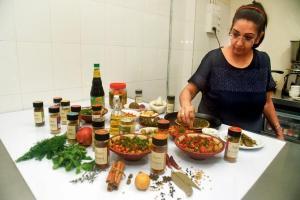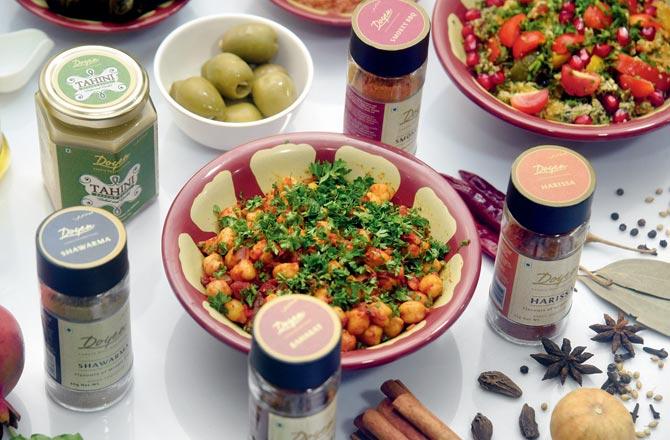After dabbling in Middle Eastern gourmet confectioneries, a Mumbai couple wants to introduce you to the dazzling spice variety from the Levant region

Kiran Dhameja and husband Haresh Bathija plan to introduce new categories such as instant mixes and ready-to-eat Middle Eastern culinary pastes, gravies and relish. Pics/Atul Kamble
Born in a Sindhi family, Kiran Dhameja grew up listening to stories of how community businesses flourished when they were settled in Shikarpur, Sindh. Her grandparents had travelled to Iran on foot, and built connections with traders in the region. Their haveli in Sindh would often host cross-border merchants. "The spices they [merchants] grew in their country was often brought to us as goods to barter or gifts." The influence, quite naturally, filtered into the food they cooked. "There are several parallels to be found between Middle East and Sindhi cuisine. We have a dish that's similar to the Lebanese starter batata harra, where potatoes are fried and then sautéed in olive oil, along with red pepper, coriander, chilli and garlic. We are big on sour food, so are they." After the Partition, there were a whole new set of culinary influences that came pouring in. "But the Middle Eastern influence stayed."
ADVERTISEMENT
Dhameja's curiosity about Mediterranean and Middle Eastern cuisine birthed her five-year-old entrepreneurial venture, Doyen Food LLP, centred around Middle East gourmet foods and confectionery. Her latest offering is a range of spice blends and seasonings that include Ras Al Hanout (Moroccan spice mix), berbere (Ethiopian red spice), Levant seven spice, Harissa (Tunisian spice), Samke Meshwi (spicy fish spice) and Baharat (Arabic garam masala). "We source the finest ingredients, like sumac and thyme from Turkey, and prepare our own blends here," says Dhameja, who, along with husband, Haresh Bathija, also supplies gourmet olives, pickles and Dolmas to luxury hotels and caterers in India. They have also brought in pomegranate molasses and rose water from Yamama, Lebanon.

Chickpea salad tossed and sprinkled with sumac and harissa
According to Dhameja, what differentiates Middle Eastern spice mixes from their Indian counterparts is the prominence of certain notes. "You'll find that some regions have a lot more cinnamon or nutmeg or pepper in the blends depending on the ingredients that grow there. The Lebanese and Iranians like their food to be mildly flavoured and sour, so they don't usually mask the original flavours of the vegetables with too many spices. That said, what we concoct are essentially Middle Eastern versions of our homegrown spices."
The couple has been researching the spice market for three years and often travel to Turkey and the UAE to experience business first hand. In Lebanon's Saida village, Bathija fondly recalls being given gastronomical tours of the local eateries by several families. "Unlike Indians, who might use the same spices across dishes, people in the Levant region have fixed spices for specific preparations," he observes. "And these are uniquely splendid in their flavour profile. For instance, the loomi [dried lemons] popular in Omani and Iranian cuisine, is used in layered rice dishes. They are made by boiling ripe limes in salt water, and then sun dried until the insides turn black and release a pungent aroma. If the pickled tang of loomi is missing in a kabseh biryani, it won't taste the same." What they also learnt in the process is that the Middle Eastern spices do not inherently have the same level of punch compared to their South Asian counterparts. "You can't beat the flavours of whole black peppercorns from Tellicherry, nutmeg from Travancore or cardamom from Idukki. So, if I use the coriander from Lebanon as is, it wouldn't work in India. We make it a point to adapt the mixes to suit the Indian palate," he says.

Haresh Bathija
The brand currently has 22 spice and seasoning mixes (priced at R150 onwards). Up next, they are trying to get hold of the robust Egyptian mint, Urfa and Pul Biber (Turkish chilli peppers) and the Moroccan cilantro, known for its fragrance.
To order: 9820079670; doyenfoods.com
Keep scrolling to read more news
Catch up on all the latest Mumbai news, crime news, current affairs, and a complete guide from food to things to do and events across Mumbai. Also download the new mid-day Android and iOS apps to get latest updates.
Mid-Day is now on Telegram. Click here to join our channel (@middayinfomedialtd) and stay updated with the latest news
 Subscribe today by clicking the link and stay updated with the latest news!" Click here!
Subscribe today by clicking the link and stay updated with the latest news!" Click here!






